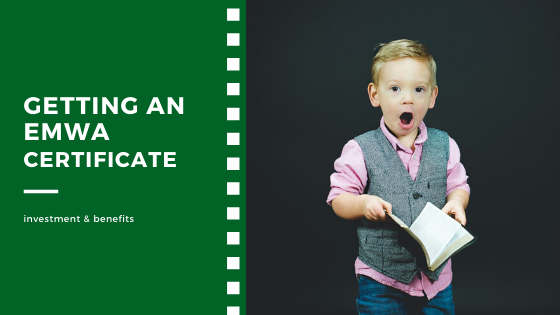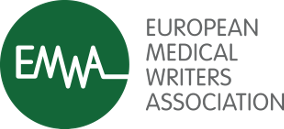
One of my most commented LinkedIn posts ever was about getting an EMWA certificate. I was flooded with congratulation messages, but also with a lot of questions: was it possible to get the certificate by completing an online course? How much did it cost? Did that mean I was a “certified medical writer” now?
After discovering what medical writing was and that EMWA provided the opportunity to get certificates, I also had questions about them. I could get much of the practical information by searching through EMWA website, and I asked medical writers in my network whether they thought it was worth getting one. Today, I give you a summary of both the practical and opinion-based aspects of EMWA certificates, so you can judge if it’s the right investment for your medical writing career.
Ready?
What is an EMWA certificate?
An EMWA certificate is part of EMWA’s Professional Development Programme (EPDP), obtained through gaining eight credits by successfully completing in-person workshops, and is a way to demonstrate your commitment to continued professional development.
Before moving to the details of how to get a certificate, let’s stop for a moment to establish what having an EMWA certificate means, and what it doesn’t mean. It means, as previously stated, that you’re committed to your professional development, and that you gained eight credits from successfully completing in-person workshops, for which you must have attended at least two EMWA conferences (more on that soon). It doesn’t mean that by having it you’ll be a “certified medical writer”, because it’s not an endorsement of your professional skills. As a professional organisation, EMWA isn’t accredited to award professional qualifications, and the goal of the EPDP is to provide training by members for members.
Some people might feel their interest fade after realising that a certificate is not a stamp of approval of medical writing capability. On the other hand, a certificate goes beyond validation, because it shows one’s dedication to a medical writing career by an ongoing upgrade of specific skills.
The investment, step by step
As we’ve seen, EMWA certificates can only be obtained by attending in-person workshops at EMWA conferences; currently, there is no online substitution for this. Each half-day workshop can gain you one credit, and double workshops run for the whole day and can give you two credits. Since you have to collect eight credits, it’s necessary to attend at least two conferences, because the maximum number of credits you can get from the spring and autumn conferences is seven and four, respectively. But bear in mind that cramming that many workshops in each conference isn’t a great idea—hear the voice of experience! In Vienna, I had to cancel my booked walking tours and walk straight to bed instead.
The purpose of attending conferences goes further than collecting workshops and credits, and you’ll want to retain some energy and time to network and attend social events. Those are fun moments, with opportunities to make meaningful connections that may lead to friendships, long-term collaborations, and (who knows?) possible work opportunities. You might also want to attend the symposium, a full day dedicated to a pertinent topic to medical writers, to expand and develop your knowledge.
As with any learning endeavour, it’s not enough to put in the money: the most important thing is to learn as much as you can from the experience. For most workshops you’ll get an assignment to do beforehand, and all workshops have an assignment to complete after it. Each assignment takes about 2-3 hours (at least!) to complete, so you’ll have about 4-6 hours of work for each of the eight workshops, on top of the 3-3.5 hours of in person training. That will result in 70+ hours of brain power poured into your certificate.
You have an EMWA certificate, now what?
After completing the required post-workshop assignment, the workshop leader will (hopefully!) award you a credit, and once you have the required eight credits, contact EMWA’s Head Office and request your certificate. They’ll check your credit record and ask you to confirm the names of the workshops that should go into that particular certificate, as well as a 100€ administrative fee. After that, they’re fairly quick to send a digital certificate via email, and you can proudly display it on your website or social media channels.
But…then what?
Well, every medical writer has a different story to tell, but I’ve never heard of someone who regretted having a certificate. From the stories I’ve collected, having an EMWA certificate can give you an advantage in getting a job interview, and help you get more enquiries about your freelance medical writing services or more recognition from senior medical writers who are in a position to pass on your name to potential employers or clients. These may seem diffuse benefits, but every step in your career has a compounding effect, helping you tread a successful path.
I hope to have given you some useful information about what it takes to get an EMWA certificate, and what you’ll gain from it.
Do you have an EMWA certificate?
Are you thinking about getting one?
Send me an email to hello[at]dianaribeiro.com and let me know your thoughts, I’d love to hear from you.
P.S. If you’re new to medical writing, why don’t you check out the Geoff Hall Scholarship that EMWA has created to encourage newcomers?

